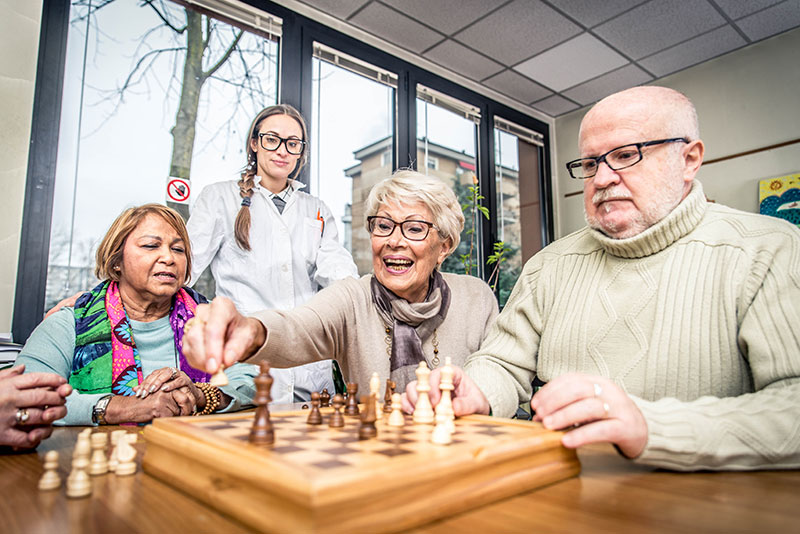The Psychological Effects of Aging: How to Cope with Change
Aging is an inevitable part of life — but that doesn’t always mean it’s an easy thing to accept. In addition to physical changes and limitations, aging can also affect our mental and emotional well-being.
While we can’t stop aging from happening, understanding and managing the psychological effects of aging can help ensure a healthier, more fulfilling life. So let’s explore the mental and emotional impacts of aging and look at strategies for coping with the changes that develop as we grow older.
Acknowledging the Changes
The first step in coping with the psychological effects of aging is to acknowledge the changes that are happening — and this goes for the individual’s loved ones and caregivers as well. Brushing changes under the rug or minimizing them does no one any good.
For example, if your senior loved one is facing growing mobility limitations, the best thing you can do is acknowledge their struggles, offer emotional support and empathy, and help them learn to navigate their new reality.
Types of Changes Seniors Can Encounter
Aging can bring on some significant life transitions, and big changes — even good ones — can take time to get used to and bring on unexpected emotional and mental challenges.
The loss of loved ones, changes in physical health or capabilities, memory issues, and decreased independence can lead to feelings of anxiety, frustration, and apathy. Even retirement can have significant psychological impacts, especially for career-oriented individuals and social butterflies.
How to Cope With Age-Related Changes
While many of the changes seniors face are unavoidable, there are coping strategies that can help mitigate their impact and ensure a fulfilling, meaningful life, despite life’s challenges. The key is focusing on capabilities, not limitations, and continuing to engage in passions and hobbies, even if it requires a few adaptations.
Maintain Social Connections
Social connections have an undeniable impact on us. In fact, according to the Centers for Disease Control (CDC), social connectedness can help prevent physical illnesses like heart disease, dementia, and strokes, as well as mental challenges like anxiety and depression.
Maintaining a social circle and engaging with others (including pets!) can help combat feelings of loneliness and isolation, which are common in older adults. Community activities, clubs or hobby groups, and even just getting together with family and friends can provide emotional support and a sense of belonging.
Stay Physically Active
Physical activity is not only beneficial for physical health but also for mental health. Regular exercise can help reduce symptoms of depression, anxiety, and stress. It also enhances cognitive function and overall mood.
Even better, there are plenty of physical activities that you can adapt to different fitness levels and capabilities. Walking is a pleasant, low-impact way to get in some exercise, and you can do it with a friend to add in a social aspect. In addition, local community centers and gyms often have exercise classes tailored for seniors or those with limited mobility, such as chair yoga and water aerobics.
Engage in Meaningful Activities
We all want to feel like we have a purpose in life, but for seniors who are facing their golden years, finding purpose and meaning can be a challenge. Retirement, empty nests, and reduced physical capabilities can make seniors feel like there’s nothing more to accomplish or contribute.
But a sense of purpose is one of the three key elements of psychological well-being, so it’s important to find activities to engage in that provide a sense of accomplishment and meaning. Whether it’s volunteering, pursuing a hobby, or learning something new, there are tons of activities seniors can enjoy that will bring joy and purpose into their lives.
Seek Professional Support
Sometimes, the psychological effects of aging go beyond what hobbies and exercise can remedy, and it’s essential to recognize when to seek professional support. While mental health issues like depression and anxiety are, unfortunately, common among seniors, they shouldn’t go untreated. Healthcare providers, counselors, and therapists can provide strategies for managing mental health challenges and help improve quality of life.
Supporting Seniors Through the Aging Process
Aging can be a challenging journey that comes with its share of psychological effects. But there are strategies and resources that can help seniors live meaningful, fulfilling lives and cope with the physical and mental aspects of aging.
At Right Hand Care, we are committed to being a part of the aging journey, and our affordable in-home care services are designed to provide not just physical but also emotional support. Our compassionate caregivers are trained to offer companionship, engage clients in meaningful activities, and encourage physical exercise, all within the comfort of the home environment.
Our services are tailored to meet the unique needs of each client, ensuring that they receive the care and support necessary to maintain their independence and enjoy a high quality of life. Whether it’s assistance with daily activities, companionship, or specialized care for those with dementia or chronic conditions, Right Hand Care is here to help.
For more information about our services or to set up a care plan, contact us today.

We are Superheroes in Comfortable Clothes™
We take care of our clients, their families, our staff, and our league of franchise owners.

